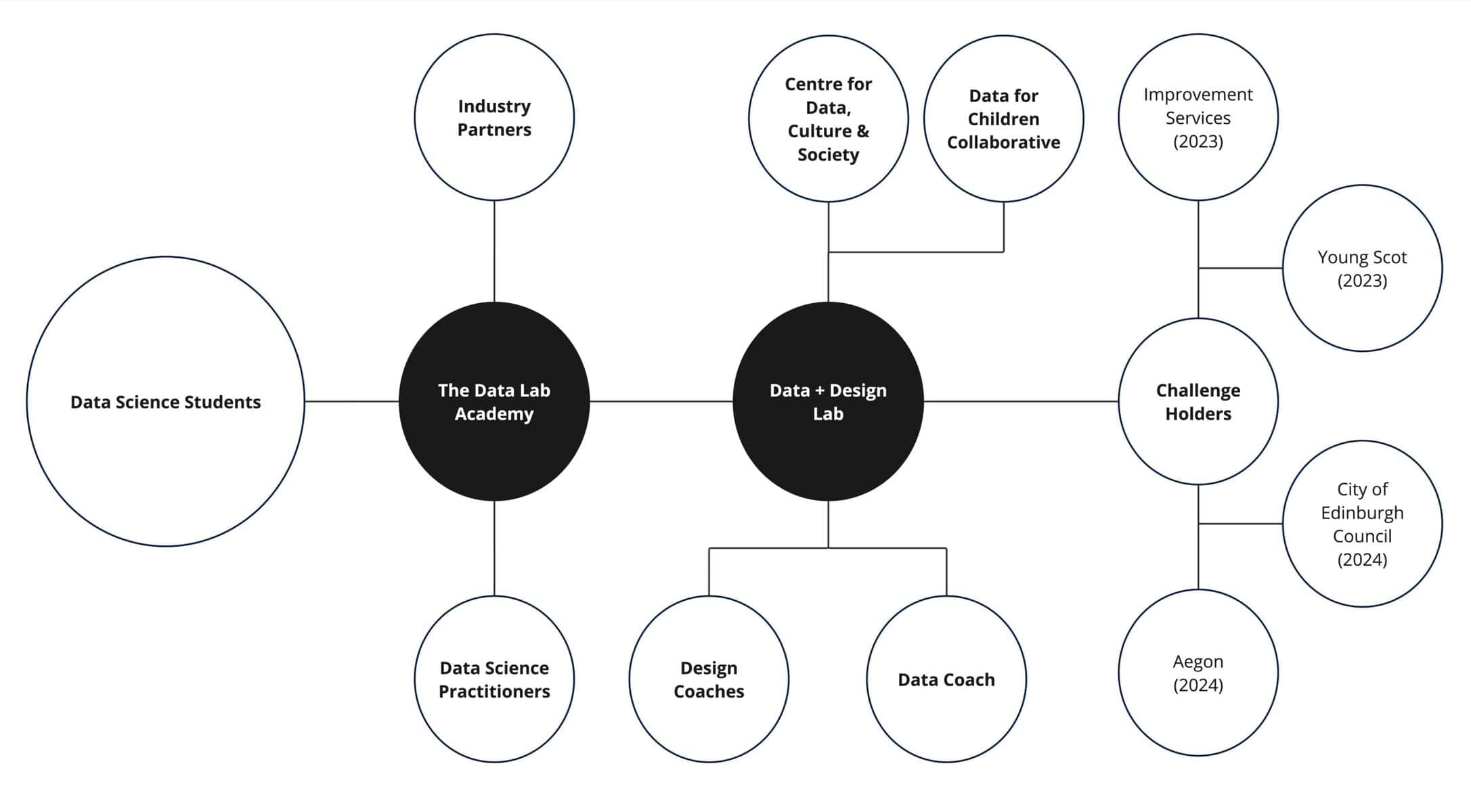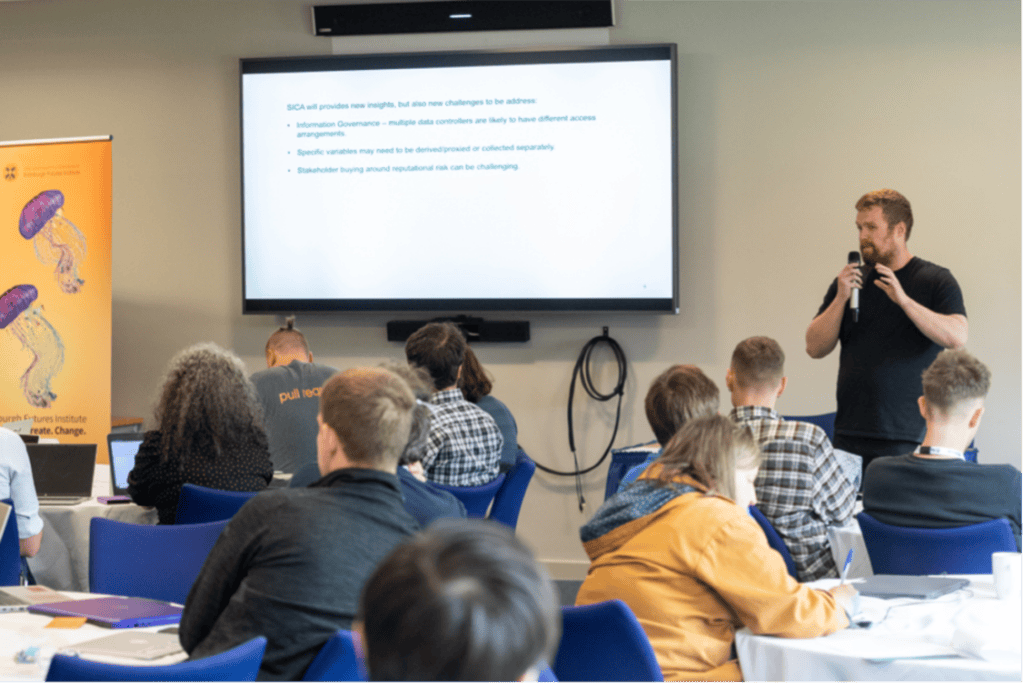How can we leverage interdisciplinary approaches, such as design and futures-led methodologies, to empower data scientists to embrace a more human-centred approach to problem-solving?
For the past two years, Data+Design Lab (D+DL), now the Futures and Design team, part of the Innovation Service at Edinburgh Futures Institute, has partnered with The Data Lab Academy (TDLA) to create Cohorts for Change, an innovative three-day programme designed to bridge the gap between theoretical data science and real-world challenges. This immersive learning experience equips data science professionals with the skills to address and co-design responses to complex societal issues using a human-centred approach. By leveraging a unique blend of data science, design thinking, and futures-led methodologies, Cohorts for Change exemplifies the Edinburgh Futures Institute’s commitment to interdisciplinary problem-solving and data-driven social innovation.
Working Across Disciplines

Cohorts for Change brings together a diverse group of stakeholders, creating a unique ecosystem for innovation. The program involves a rich network of stakeholders, which creates a unique ecosystem for innovation.
- Participants are MSc students studying data science courses across universities in Scotland, representing various backgrounds from computer science and AI to social sciences and humanities.
- Participants are supported in ideation and concept development by design coaches, who are experts in human-centred design methods, and a data coach, a specialist in data science and digital technologies.
- Industry knowledge is provided by the challenge holders, industry-based mentors, and academics and subject experts based at the Futures Institute.
This diverse mix of stakeholders fosters valuable connections between academia and industry, bridging the gap between theoretical knowledge and practical application. By introducing data science students to human-centred design methodologies, the programme creates a network of professionals who can integrate these approaches in their future work. Direct interaction between participants and challenge holders facilitates relationships to drive future projects and initiatives.
Developing a Challenge-led Approach
At the heart of Cohorts for Change are carefully crafted challenge questions that address pressing societal issues. These questions are developed in collaboration with our challenge holders to ensure relevance and real-world applicability. For instance, Innovation Week 2024, which focused on “Translating Financial Insights for Social Impact,” the City of Edinburgh Council posed the challenge: “How can we leverage data science to identify individuals and communities at risk of homelessness?” Other challenge questions have explored topics such as improving financial literacy among young people, enhancing public services, and creating more personalised financial products.
Participants are tasked with developing innovative, data-driven solutions to these challenge questions within a short timeframe. They must analyse the challenge space using futures-thinking methodologies, identify relevant data sources and insights, apply design thinking principles to create user-centred solutions, develop prototypes or proof-of-concepts, and present their findings and recommendations to challenge holders and experts.
D+DL plays multiple roles in designing and facilitating the Cohorts for Change programme. We start with challenge framing workshops, where we work with partners to understand their challenge space and collaboratively articulate challenge statements that ignite curiosity and drive action. For TDLA’s Innovation Week, we have collaborated with challenge holders across the private and third sectors, including Young Scot, Improvement Services, Aegon, and the City of Edinburgh Council.
Challenge framing is followed by data curation and curriculum development to incorporate human-centred design and future-oriented methodologies to help participants address the challenge questions. We work in partnership with the Centre for Data Culture and Society to recruit a data coach specialising in data science and digital technologies who works with challenge holders to curate a Data Playground. For Innovation Week 2024, our Data Coach curated the Data Playground with data dictionaries and dashboards developed in partnership with the challenge holders and Smart Data Foundry, ensuring participants had well-organised tools at their disposal and did not have to sift through raw data.
Participants of Innovation Week come from diverse backgrounds and our core objective is to introduce them to human-centred design and futures-oriented thinking. Accordingly, we get participants to engage with “The Futures Triangle,” a foresight method developed by Professor Sohail Inayatullah, as it helps think through a challenge space in terms of historical contexts, current trends, and potential future directions. One advantage of using ‘this method is that it has a low entry point, making it easy for any “quantitatively-minded participant, the visionary, and the cynic” (Inayatullah, 2023) to map out the future, compare and contrast different scenarios, and use them to clarify their vision and strategy, or, in this case, thinking about the broader context of the challenges at hand.
We facilitate active learning through workshops, seminars, and collaborative activities that catalyse interdisciplinary problem-solving. Presentations by subject experts, including our peers at the Data for Children Collaborative and the cohort Lead for the MSc Service Management and Design programme at the Futures Institute offer new perspectives on responsible innovation and challenge participants to think critically about their data practices. The design and data coaches provide expert guidance throughout the programme and we also curate learning materials to support participants in their journey. This ensures that every participant, regardless of background, has the tools and support to develop innovative responses to the challenge questions.
“Being invited to be a challenge holder for The Data Lab Innovation Week was an honour – with so many talented students and staff committed to using their skills and knowledge to solve real-world problems, having that collective knowledge focussed on homelessness issues was a privilege. By working with the EFI [Edinburgh Futures Institute] team to finesse the challenge question, weaving in homelessness data, poverty data, geographical issues and issues of data ethics and availability of technology, we arrived at a focused challenge that tested what we already know but acknowledged that it was insufficient to get us to where we need to be.”
– Derek McGowan, Service Director, Housing and Homelessness | The City of Edinburgh Council
Enabling Change and Making Impact

Cohorts for Change drives impact through its innovative process and tangible outcomes. The programme breaks down barriers between data sciences, human-centred design, and domain-specific knowledge, encouraging holistic problem-solving. Participants gain hands-on experience in interdisciplinary teamwork, design thinking, and futures-led methodologies, enhancing their professional skillset.
By emphasising an empathetic approach to understanding user needs, the programme ensures that data-driven solutions are more relevant and impactful. The use of futures-thinking methodologies, such as The Futures Triangle, encourages participants to consider long-term, systemic impacts of their proposed solutions. Discussions on responsible innovation and data ethics are integrated to promote more thoughtful and ethical data practices.
The intensive nature of the programme encourages quick iterations and prototyping, fostering an agile approach to problem-solving. This process generates fresh perspectives for challenge holders, who receive innovative ideas and solutions from diverse, interdisciplinary teams and participants develop a more human-centred professional practice. Over the past two years, the programme has engaged 144 MSc students from 29 courses and 14 universities, creating a robust network of data science professionals with designerly skills.
“I really enjoyed the social aspect of the whole program; getting to work on a project with people that you just met taught me a lot in terms of working and collaborating with a team and getting results out during a fairly hectic schedule was a great learning curve.”
– Student Participant, 2024
Conclusion
Cohorts for Change offers a compelling model for engagement and impact, demonstrating the transformative potential of interdisciplinary, data-driven social innovation. By bringing together diverse stakeholders to address real-world challenges, the programme equips data scientists with the skills to create more human-centred, impactful solutions. In addressing the intricate nature of societal issues, initiatives like Cohorts for Change play a vital role in bridging the gap between theoretical knowledge and responsible real-world applications, fostering a more inclusive and responsive approach to social innovation. The next iteration of Cohorts for Change is scheduled for May 2025, with The Scottish Government and Wheatley Group serving as the Challenge Holders for the student cohort.
As we continue to face complex global challenges, the need for interdisciplinary approaches to problem-solving becomes increasingly apparent. Cohorts for Change not only addresses this need but offers a practical example for how educational institutions, industry partners, and design and futures practitioners can collaborate to create lasting social impact. For those interested in adopting similar methodologies or learning more about The Futures Triangle, we recommend this article by Sitra.
If you’re considering hosting or facilitating an event similar to Cohorts for Change for your organisation, we welcome the opportunity to discuss how we can tailor this approach to your specific needs. Please reach out to us at ddl.efi@ed.ac.uk.
Project Summary by Numbers
| Core Teams -Data + Design Lab -The Data Lab Academy | Sector Higher Education 14 Universities Abertay University / Edinburgh Napier University / Glasgow Caledonian University/ Heriot-Watt University / Robert Gordon University / The University of Edinburgh / University of Aberdeen / University of Dundee / University of Glasgow / University of St Andrews / University of Strathclyde / University of Stirling / University of the Highlands and Islands / University of the West of Scotland 29 Courses MSc Advanced Computing / MSc Advanced Computing and Artificial Intelligence / MSc Advanced Computer Science with Artificial Intelligence / MSc Advanced Computer Science with Big Data / MSc Applied Artificial Intelligence and User Experience / MSc Applied Data Analytics / MSc Applied Data Analytics / MSc Applied Data Science / MSc Artificial Intelligence / MSc Artificial Intelligence / MSc Artificial Intelligence / MSc Big Data / MSc Big Data Technologies / MSc Business Analytics / MSc Business Analytics / MSc Computing Science / MSc Data Analytics / MSc Data Engineering / MSc Data Science / MSc Data Science and Engineering / MSc Data Science for Business / MSc Data Science for Politics and Policy Making / MSc FinTech / MSc Health Data Science / MSc Geographical Information Science / MSc Information Technology with Business Intelligence / MSc Mathematics and Data Science / MSc Satellite Data for Sustainable Development / MSc Urban Analytics |
| Collaborators -Data for Children Collaborative -Centre for Data Culture and Society -Chancellor’s Fellows -UOE PhD Students | |
| Partners -Improvement Services -Young Scot -Aegon -City of Edinburgh Council -Smart Data Foundry | |
| Participants AY 22-23 – 71 Data Science Students AY 23-24 – 73 Data Science Students |





